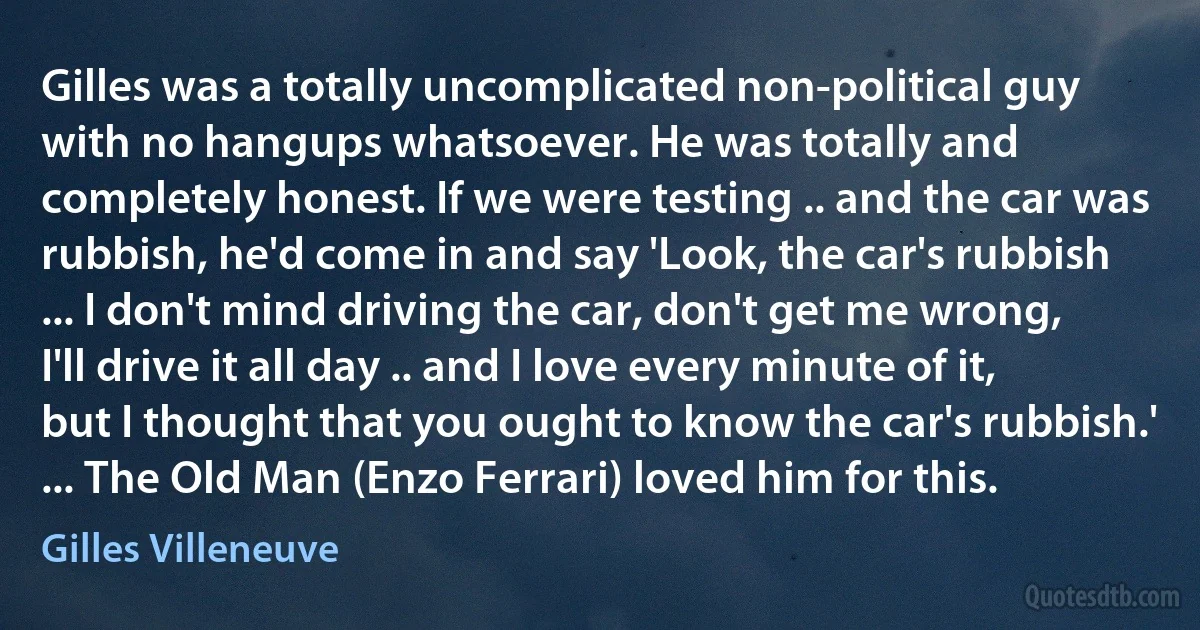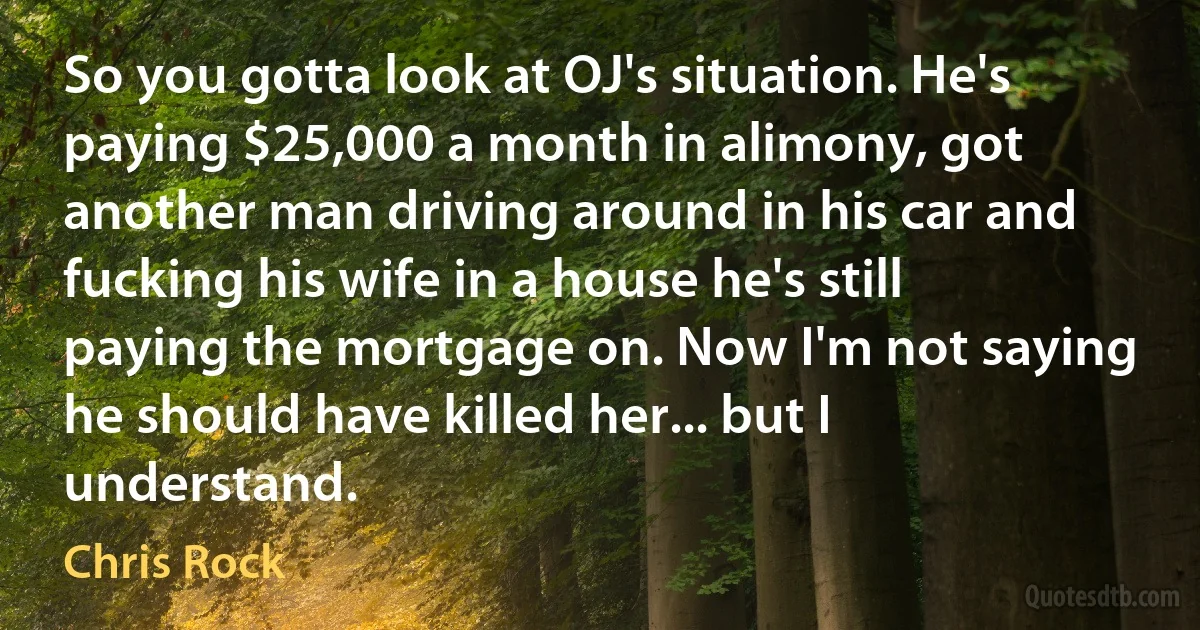Driving Quotes - page 33
The War on Drugs is over. Drugs won. It's time to stop wasting money, destroying lives, grinding up the Bill of Rights, and giving greater and greater power to the jackbooted thugs, in an unnecessary and futile attempt to enforce one group's ideas about what chemicals and vegetables some other group ought to manufacture, cultivate, distribute, purchase, possess, and consume. Repeal the drug laws, and prices will drop a thousandfold, driving most participants out of the business.

L. Neil Smith
A world in which cultural identities - ethnic, national, religious, civilizational - are central, and cultural affinities and differences shape the alliances, antagonisms, and policies of states has three broad implications for the West generally and for the United States in particular.
First, statesmen can constructively alter reality only if they recognize and understand it. The emerging politics of culture, the rising power of non-Western civilizations, and the increasing cultural assertiveness of these societies have been widely recognized in the non-Western world. European leaders have pointed to the cultural forces drawing people together and driving them apart. American elites, in contrast, have been slow to accept and to come to grips with these emerging realities.

Samuel P. Huntington
The dumbest thing of all, I think, you can think in a New York cab is "Well, the man knows what he's doing!" "I mean, he is driving a little fast, but he's a professional cab driver. He's got a cab driver's license; I can see it right there." I don't even know what it takes to get a cab driver's license. I think all you need is a face... and a name with, like, eight consonants in a row.

Jerry Seinfeld
Flying doesn't make me nervous. Driving to the airport can make me nervous. Because if you miss that plane, there's no alternative. [...] No airline goes, "Well, you missed the flight. We do have a cannon leaving in about ten minutes. Would you be interested in that? It's not a direct cannon, you have to change cannons after you land."

Jerry Seinfeld
A typical "explained" incident is the one reported by Sir Chester Ramsbottom, on June 5, 1961, in Shropshire: "I was driving along the road at 2 A.M. and saw a cigar-shaped object that seemed to be tracking my car. No matter which way I drove, it stayed with me, turning sharply at right angles. It was a fierce, glowing red, and in spite of twisting and turning the car at high speed I could not lose it. I became alarmed and began sweating. I let out a shriek of terror and apparently fainted, but awoke in a hospital, miraculously unharmed." Upon investigation, experts determined that the "cigar-shaped object" was Sir Chester's nose. Naturally, all his evasive actions could not lose it, since it was attached to his face.

Woody Allen
I am always interested in the ways of scoring the sound of the poem, especially a poem with long lines. Spaces within a line, double colons, slashes, are indications of pause, of breath, of urgency, they are not metrically exact as in a musical notation but they serve (I hope) to make the reader think about the sound of the poem-just as traffic symbols, when driving, make us almost unconsciously aware of a steep hill, an intersection, an icy bridge etc. Poets have used such indicators long before modernism-Dickinson's dashes and capitals are one example. Contemporary composers have also expanded on classical notation with new, self-invented markings. You want to find a way that is not random or chaotic but allows for various renderings of a line, a punctuation of the imagination.

Adrienne Rich
At Newark airport, I climbed into a taxi. Wearing my uniform with all my ribbons and my Vietnamese airborne beret, I kept waiting for the driving to make a big fuss and exclaim "Hey! You're just back from Vietnam, aren't you!" Nothing. So I fed him hints like, "Gee, I haven't seen Newark for a while." But he dropped me at my mother's place with scarcely a word... I was pretty disoriented. I couldn't think about anything but Vietnam. The war was all over the newspapers, but people seemed not to care. Even when Mom introduced me to a few of her friends, they only said things like, "Well, I guess now you'll be able to get on with your life." No one wanted to know about Vietnam: the public wasn't caught up in the war, not at all like the spirit I remembered from my boyhood, during World War II. After two days I wanted to run through the streets yelling, "Hey! In Vietnam people are dying! Americans are dying! How can you act like nothing is happening?"

Norman Schwarzkopf, Jr.
I had come to the limits of shooting pool, playing poker and bullshitting over beers, of driving off with other guys and broads into lonely orchards, clawing clumsily at skirts and panties, clawing in vain. Women were fine but demanding, you hurt easily at nineteen; you thought women were sweet and submissive but find them alley cats; you find comfort in whores less deceitful, and if you are lucky you learn to read.

John Fante
The real religion of the world comes from women much more than from men, - from mothers most of all, who carry the key of our souls in their bosoms. It is in their hearts that the "sentimental" religion some people are so fond of sneering at has its source. The sentiment of love, the sentiment of maternity, the sentiment of the paramount obligation of the parent to the child as having called it into existence, enhanced just in proportion to the power and knowledge of the one and the weakness and ignorance of the other, - these are the "sentiments" that have kept our soulless systems from driving men off to die in holes like those that riddle the sides of the hill opposite the Monastery of St. Saba, where the miserable victims of a falsely-interpreted religion starved and withered in their delusion.

Oliver Wendell Holmes, Sr.
I sometimes wonder whether hon. Members opposite really have any understanding of what hot industrial fires they are playing with and whether they understand what deep fissures they are driving into our society, at a time when we in this country, of all countries, should be showing how violent tensions can be relieved without violence... When I look across at the benches opposite, not only at the Front Bench but at those behind, it seems to me very often that what they speak for is...a narrow, blinkered, suburban England with no conception whatsoever of industrial Britain.

Michael Foot
He abhors the label right and calls himself a Tory radical. For him the essence of Powellism is its frankly Gaullist emphasis on national independence and its marking out of political ground in which a realistic patriotism can flourish again. But paradoxically it is not rightist in the old-style Tory sense. Mr. Powell, unlike the true Tory right, calls for a withdrawal from Empire not even into Europe but into Britain... Mr. Powell is seen by his lieutenants as the latter-day Joe Chamberlain in the Tory Party, the boy from "Brum" who, though he is unlikely ever to lead his party, will change its orientation and nature by driving it into a Gaullist radicalism rather than on to the right.

Enoch Powell
I meet a lot of parents that say, "what, what can I do”, you know, and I say, ‘"Stop driving your kids to school!” This is crazy. It'll be healthier for you and healthier for the environment. So it's not just the way we design our cities differently, but our own behavior within the cities.

David Suzuki
The major premise of the conclusion expressed in a statute, the change of policy that induces the enactment, may not be set out in terms, but it is not an adequate discharge of duty for courts to say: We see what you are driving at, but you have not said it, and therefore we shall go on as before.

Oliver Wendell Holmes Jr.
...The rise, triumph, and victory of Spinozism in Europe are reminiscent of the power of ancient Buddhism because both are religiosity rather than philosophy. Spinozism is religion even when it operates with bizarre formulas. Its starting-point is a dead God, who is reminiscent of Buddha's Brahma. It is man's metaphysical fear and not the idea of a living God which is the driving force in religiosity. True religiosity is not an understanding of how God is correlated to man and to the world but the feeling of man's insignificance in the cosmos, giving birth to a state of meekness, humbleness, compassion, and pity. Only when man is crushed and overwhelmed by the thought of his insignificance in this vast universe does he become truly religious. These feelings are as present in Spinozism as they are in Buddhism.

Baruch Spinoza
More than a dozen were shot down on the first day of the invasion by scared, trigger-happy soldiers, kids, most of them, who pursued the Tommyknockers from house to house. After a while, some of the invaders' fear began to rub off. By afternoon they were actually having fun-they were like men driving rabbits through wheat. Two dozen more were killed before the Army doctors and Pentagon brain-trusters realized that the air outside of Haven was lethal to these freak-show mutations who had once been American tax payers. The fact that the invaders could not breathe the air inside Haven would have seemed to have made the converse self-evident, but in all the excitement, no one was really thinking very well (Gard wouldn't have found this very surprising).

Stephen King
Rus! Rus! I see you, from my lovely enchanted remoteness I see you: a country of dinginess, and bleakness and dispersal; no arrogant wonders of nature crowned by the arrogant wonders of art appear within you to delight or terrify the eyes... So what is the incomprehensible secret force driving me towards you? Why do I constantly hear the echo of your mournful song as it is carried from the sea through your entire expanse?... And since you are without end yourself, is it not within you that a boundless thought will be born?

Nikolai Gogol
The promise of survival beyond individual death or dispersion appeals to the most primal driving force of existence. Promises of transcendence have evolved out of the thriving desire to ward off the inevitable threat of individual death. Most systems propose a more or less perfect immortality – one where memories, hopes, desires, knowledge and even experiences survive the death of the physical body. An engagement and acceptance of this meme makes death particularly irrelevant. The upholding of the promise at the cost of individual sacrifice becomes acceptable. Individual sacrifices even become necessary in validating the promise.

Anand Gandhi

![Whenever we see a growing entity, whether it be a population, a corporation, a bank account, a rumor, an epidemic, or sales of a new product, we look for the reinforcing loops that are driving it and for the balancing loops that ultimately will constrain it. We know those balancing loops are there, even if they are not yet dominating the system's behavior, because no real physical system can grow forever. [...] An economy can be constrained by physical capital or monetary capital or labor or markets or management or resources or pollution. (Donella Meadows)](https://cdn.quotesdtb.com/img/quotes_images_webp/87/donella-meadows-account-balancing-1011087.webp)

